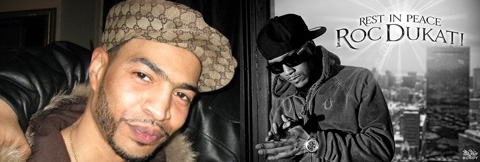
JOHNNY HATCH AND ROC DUKATI |
Parking is scarce in Medford Square this morning. Carloads of folks arrive over the course of an hour, eventually filling the Gaffey Funeral Home and spilling onto High Street. The crowd is here to honor Johnny Hatch, a father, boyfriend, son, and Hub rap veteran who was shot to death in his Medford home two weeks ago. Relatives of the deceased sob uncontrollably, as do his friends, though some are sporting dark shades to mask their sadness. One of Johnny's comrades, squeezing back tears, fixates on a pic of Hatch posing with his longtime rap crew, Mikst Nutz.
By the time this article appears in print, another notable Boston rap personality will also have been laid to rest. Jamie Lee, who rhymed under the name Roc Dukati, was the victim of a shooting off Tremont Street in the early hours of March 2. A father to a seven-year-old boy, Lee was a member of the LIFE4LIFE entourage, and, along with acts including singer Masspike Miles and his older brother Smoke Bulga, had amassed one of the most earnest followings in Boston hip-hop. Whether the gauge is analytical (YouTube views) or anecdotal (ask any teen on Blue Hill Avenue if they know these guys), Lee's squad has a significant influence.
There has been some media coverage, much eulogizing, and a torrent of micro-blogging about the deaths of Hatch and Lee. And while both crimes are unsolved, unrelated, and apparently unconnected to the music scene, there seem to be two important themes emerging.
First, these killings have gotten attention because the victims were public figures. When someone notable — especially an entertainer — is murdered, the often-ignored issue of violent crime suddenly surfaces front-and-center. That goes double in Boston, where the media is hungry for homegrown stars. It's well known that there were 72 homicides here last year alone, yet individual victims rarely attract as much attention as the Hatch and Lee slayings.
The other theme is that these two events, no matter how unfortunate, might lead to good: the legacies of both men could inspire prominent artists to help curb street violence. The Boston rap scene has historically met tragedy with positive efforts — one of which, a vast coalition of artists called Us Making Moves Forever (UMMF), boasted both Hatch and Lee as members in the 1990s.
"We're a powerful group of people," says Cindy Diggs about the local rap community. A neighborhood activist who's known in some circles as Mother Hip-Hop, Diggs founded UMMF, and now organizes with the anti-violence group Peace Boston. "People look up to these guys. If we were able to do it before, then we can do it again today — we just need to get together and send out a single message that what's going on needs to stop, and that it needs to stop now."
FAMILY FIRST
Lee rapped like the first name of his monikersuggested: hard and unforgiving. As for his surname Dukati, an homage to Italian blacktop rockets — that's more fitting of his work ethic than his style. Like his older brother Smoke, who is one of Boston's most esteemed MCs of all time, the 29-year-old Lee's flow was slow and calculated, as demonstrated on "How Ya Living," his marquee collaboration with Harlem icon Cam'ron. In an eerie coincidence, the video for that track features a scene in the theater district one block away from where Lee was gunned down after leaving a mix-tape release party for Cambridge rapper Millyz.